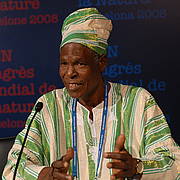The movers and shakers
08 October 2008 | News story
It seems the old ways are always the best. The Equator Prize, announced during a ceremony at the Congress, recognizes the work of communities who are conserving biodiversity and generating income through traditional methods.
The world's greatest concentrations of biodiversity are found in the tropics, in countries that also have some of the highest levels of poverty. The Equator Prize is part of the Equator Initiative, a partnership that brings together the United Nations, civil society, business, governments and communities to help build the capacity and raise the profile of grassroots efforts to reduce poverty through the conservation and sustainable use of biodiversity.
Five communities were selected from this year’s 25 winners to receive “special recognition”. The eminent jury of included Ted Turner, Muhammad Yunus and M.S. Swaminathan.
In Ghana the Weichiau Community Hippo Sanctuary protects more than 500 species that live along the Black Volta River. It is operated by a management board that represents over 10,000 people from 17 communities. Two zones have been demarcated, one a protected area close to the river for the hippos, the other for people. Local communities are seeing real benefits from protecting their biodiversity and from revenues generated by the sanctuary.
“We’ve got education, we’ve got drinking water, we’ve got solar lighting,” said leader of the initiative Chielinah Bandana.
The Community Development Centre (CDC) in Sri Lanka conserves about 60 varieties of roots and yams using these traditional crops to generate income for farmers. Worm farming and composting provide two additional sources of income. More than 300 households are involved in the community scheme and the CDC model is being replicated across Sri Lanka. “We now have a very secure future,” said one of the community leaders.
Founded by local women in 2003, Artisans Association of Arbolsol and Huaca de Barro of the Morrope District in Peru is reviving traditional methods of cotton production that are environmentally-responsible and bring social and economic benefits to the region.
The Indonesian Community-based Marine Management Foundation supports communities in Papua, West Papua and the Moluccan Islands in managing their marine resources through traditional tenure systems known as sasi. Community-based marine management areas conserve local biodiversity and boost incomes. The approach is being replicated throughout the region. “We have formed a network of communities based on the fact that we can’t tackle climate change impacts alone,” said one of the Foundation leaders.
In Ecuador the Union of Farming and Indigenous Organizations of Cotacachi involves more than 3,000 Quechua families dedicated to improving the quality of life of indigenous Ecuadorians. The group focuses on conservation of agricultural biodiversity, the revival of traditional cultural practices and comprehensive community participation. Local incomes have increased dramatically and community members now grow more than half of their own food.
The initiatives have become so successful that their leaders are now advising their respective governments on how to use natural resources sustainably and how to link biodiversity conservation with poverty reduction. The winners are taking the opportunity here at the Congress to exchange their experiences, ideas and solutions.







